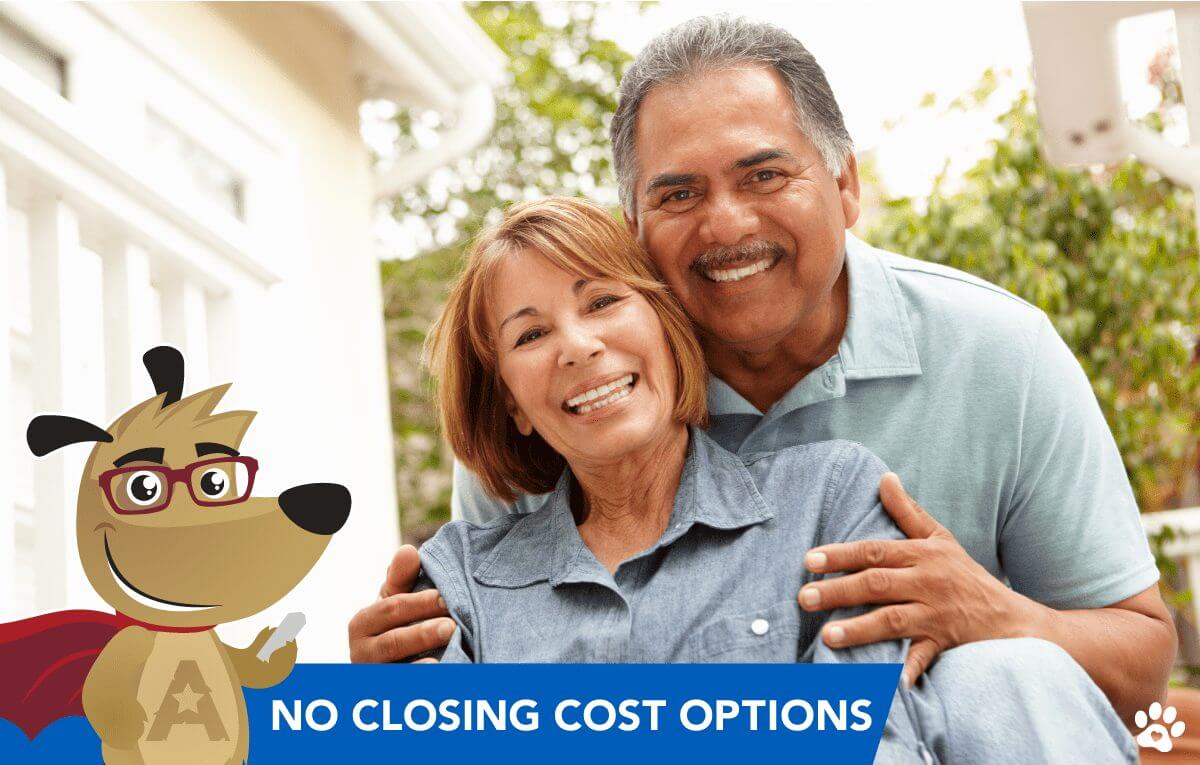
Discover No-Closing Cost Reverse Mortgages
No Closing Cost Reverse Mortgage Options are BACK!
 |
Michael G. Branson, CEO of All Reverse Mortgage, Inc., and moderator of ARLO™, has 45 years of experience in the mortgage banking industry. He has devoted the past 20 years to reverse mortgages exclusively. (License: NMLS# 14040) |
 |
All Reverse Mortgage's editing process includes rigorous fact-checking led by industry experts to ensure all content is accurate and current. This article has been reviewed, edited, and fact-checked by Cliff Auerswald, President and co-creator of ARLO™. (License: NMLS# 14041) |
Understanding No-Closing Cost Reverse Mortgages
Reverse mortgages, like HUD’s Home Equity Conversion Mortgage (HECM), are often associated with high upfront fees, such as a 2% mortgage insurance premium based on the property value or lending limit (whichever is lower). This reputation for high costs can deter potential borrowers. However, no-closing cost reverse mortgages offer a more affordable alternative.
How do they work, and what do they mean for borrowers? Let’s explore the evolution and mechanics behind these options.

The Evolution of No-Closing Cost Reverse Mortgages
In 2010, HUD introduced the HECM Saver, a lower-cost version of the traditional reverse mortgage designed to ease the financial burden on borrowers. By reducing the initial mortgage insurance premium, it aimed to make reverse mortgages more accessible. However, this came with a trade-off: borrowers received less money, which didn’t meet the needs of many. Due to its limited popularity, the Saver program was discontinued in 2013.
The discontinuation of the Saver option didn’t end the pursuit of affordable reverse mortgages. Today, no-closing cost options have re-emerged through innovative lender strategies, offering borrowers new ways to minimize upfront expenses. Understanding this evolution provides insight into the modern reverse mortgage landscape.
How Lender-Paid Closing Cost Credits Work
All loans, including reverse mortgages, come with inherent costs: title reports, credit checks, appraisals, closing services, and third-party fees. While these expenses are unavoidable, lenders can offer credits to offset them for borrowers. One exception is the reverse mortgage counseling fee (typically $125–$175), which must be paid to an independent company and cannot be covered by the lender. Fortunately, free or subsidized counseling is often available through government grants or support programs with a little research.
The size of lender credits and their interest rates vary widely between lenders. This variability makes it critical to shop around. In many cases, borrowers can secure a reverse mortgage with little to no out-of-pocket costs, though the lender absorbs these expenses, which may affect the loan’s terms or pricing.
Why Lender Credits Vary Across Loan Types
Not all reverse mortgages offer the same potential for lender credits. A lender’s ability to cover costs depends on how much revenue the loan generates, which varies by loan type and size:
- HECM Loans: Smaller HECM loans may not generate enough revenue to cover all third-party costs, limiting the availability of full credits. However, partial credits are often possible, reducing upfront expenses and the interest that would accrue on them.
- Jumbo Loans: Larger proprietary or jumbo reverse mortgages provide lenders with more financial flexibility, making no-cost or low-cost options more common.
- HECM-to-HECM Refinances: Refinancing an existing HECM can lower the mortgage insurance premium, creating additional room for lender credits.
This variability highlights the importance of exploring your specific loan scenario to uncover potential savings.
| Loan Type | Typical Upfront Costs | Lender Credit Availability | Best For |
|---|---|---|---|
| HECM (Standard) | High (2% MIP + fees) | Partial credits possible | Borrowers needing flexibility |
| HECM (Refinance) | Lower MIP, standard fees | Higher credit potential | Existing HECM borrowers |
| Jumbo/Proprietary | Varies by lender | Full credits more common | Borrowers with high-value homes |
| Note: MIP = Mortgage Insurance Premium. Counseling fees ($125–$175) are excluded from lender credits but may be subsidized elsewhere. |
Closing Cost FAQs
Are reverse mortgages expensive?
They can be more expensive than other loans, but there can be times when lenders can pay fees on behalf of borrowers. Borrowers should always shop around and not just take a loan because they like the TV pitchman.
How much are closing costs on a HECM loan?
They can range from just the counseling fee ($125 – $150) to over $30,000, depending on the closing costs for your area. Some states have more expensive closing costs than others. The ability to waive or credit fees is market and interest-rate dependent. It would be best if you always compared costs from multiple companies.
What reverse mortgage has the lowest closing costs?
The reverse mortgage with the lowest closing costs is one where the lender can help pay some or all the borrower’s costs at closing. The ability to do this depends on secondary marketing conditions and the interest rate option, so shop around.
How does the interest charge work on a reverse mortgage?
Do you need a good credit score to get a reverse mortgage?
Key Takeaways
No-closing cost reverse mortgages don’t eliminate fees—they shift them. Lenders cover upfront costs in exchange for adjustments in interest rates or loan terms. While this can make reverse mortgages more accessible, the best option depends on your financial goals, loan size, and lender offerings. Comparing quotes and understanding trade-offs are essential steps to securing the most affordable solution.

 Michael G. Branson
Michael G. Branson Cliff Auerswald
Cliff Auerswald

February 19th, 2022
February 22nd, 2022
December 17th, 2018
December 18th, 2018
February 18th, 2013